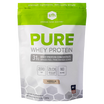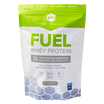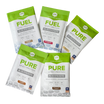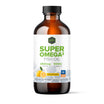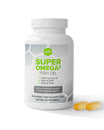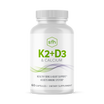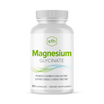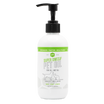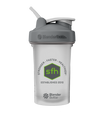Fish Oil For Pregnancy
When you’re pregnant, there’s a whole lot more you need to think about than your own personal nutrition needs. The responsibility of eating for two means that many women need to tweak their diets and, in many cases, take a nutrition supplement or two to ensure that they’re getting all the nutrients that both they and their growing bundle of joy need.
In addition to some of the most well-known nutrients essential for healthy fetal development, like iron and folate, it’s becoming increasingly clear that an adequate omega-3 fatty acid intake plays a huge role in keeping both mother and baby happy and healthy.
Read on to learn everything you need to know about fish oil for pregnancy, and how to ensure that you’re getting enough omega-3s for both yourself and your growing baby.
Is it safe to take fish oil during pregnancy?
Yes, as long as you’re using an excellent high-quality supplement, fish oil is perfectly safe to take during pregnancy.
In fact, it may even be safer than getting your omega-3s straight from the source! Fatty, cold-water fish are excellent sources of docosahexaenoic acid (DHA) and eicosapentaenoic acid (EPA), two of the most active forms of omega-3s (hence why fish oil is such a good supplement to begin with!). But these fish also come with potential health hazards due to mercury contamination.
In fact, the FDA suggests that pregnant or breastfeeding people limit their fish consumption to between 8-12 ounces two to three times per week. This would mean that you’re only getting about 100-250 mg per day of omega-3 fatty acids and 50-100 mg of which would be from DHA, which is less than what you would actually need when you’re pregnant.
Benefits of taking Fish Oil during pregnancy
So why might you need fish oil while you’re pregnant? Simple: your growing baby needs those valuable omega-3s for healthy development.
- Bright minds: The omega-3 DHA is one of the most important fats that make up your brain and central nervous system tissue, which means that it plays a huge role in healthy brain development. There’s even evidence that getting enough omega-3s during pregnancy can result in children who later score higher in various cognitive, communication, and behavioral tests.
- Clear eyesight: In addition to brain development, DHA also seems to play a significant role in eye development, and this is thought to translate to better eyesight over time. For example, a small study that sought to evaluate the relationship between omega-3s during pregnancy and subsequent vision found that the children whose mothers ate more fish during pregnancy ended up scoring better than children whose mothers ate less fish.
- Length of gestation: As it turns out, the amount of omega-3s you consume while pregnant may also play a role in ensuring that your pregnancy is brought to full term. Several studies have suggested that omega-3 supplementation may be linked to gestational length (in other words, the amount of time your baby spends growing in your womb). This also means that an adequate omega-3 intake may reduce the risk of pre-term births!
How much omega-3s should be taken during pregnancy?
If you’re pregnant, you should aim to consume about 650 mg of omega-3s per day.
It’s also important to note that the kind of omega-3 you’re consuming also matters. 300 mg of those omega-3s should be DHA since it’s especially crucial for healthy development, so make sure you’re choosing a supplement carefully.
Benefits post-pregnancy
Getting enough omega-3s gives your baby a solid nutritional foundation and a good head start, but the benefits of omega-3s don’t stop after you give birth, either. Continuing to eat an adequate amount of EPA and DHA after you give birth can ultimately mean better physical and mental health for both mother and baby through all stages.
Breastfeeding
Passing on the brain-boosting benefits of omega-3s from mother to child doesn’t stop after birth -- they may continue through nursing as well. It’s recommended that lactating women consume at least 200 mg of DHA daily.
Postpartum Depression
They’re not just good for baby -- they’re also good for mom! We’ve known for a long time now that omega-3 fatty acids can play a role in mental health, and this connection is highlighted when evaluating the effects of these healthy fats on women with postpartum depression. Some studies have found evidence of low omega-3 levels among women experiencing postpartum depression. What’s more, pregnant and lactating women are particularly at risk for DHA insufficiencies due to the nutritional demands their growing babies place on them.
SFH Fish Oil Options
If you’re looking for the best omega-3 supplements for yourself and your baby, check out SFH’s fish oil products!
Our high-quality fish oil is derived from wild-caught Alaskan Pollock and concentrated with molecular distillation for optimum EPA and DHA in each dosage. We have two different options you can choose from:
- For those that are pill-adverse, try our Liquid SFH Omega-3 Fish Oil + Vitamin D3. In addition to EPA and DHA, this liquid fish oil also comes with Vitamin D3, a nutrient that has also been associated with improved development during pregnancy as well as a reduced risk of preterm birth, preeclampsia, and gestational diabetes.
- If you prefer your fish oil in capsule form, try our Omega-3 Fish Oil Gel Caps. It’s a convenient way to get the perfect Omega-3 dosage in an easy-to-swallow gel capsule every single time. In addition, these gel caps also feature enteric coating for maximum GI absorption and fewer fish burps.
Conclusion
Omega-3s are some of the most important nutrients to consider if you’re pregnant, and fish oil supplements make it easier than ever to ensure that you’re getting enough of it every single day. Look out for high-quality fish oil with a healthy dose of DHA to give you and your baby the healthy fats you need for a happy, healthy pregnancy.
Meet the Author

Erica Digap is a science-minded copywriter specializing in evidence-based nutrition science, fitness, and health content. After receiving her Bachelor of Science in Clinical Nutrition from the University of California, Davis, and working as a consultant and director in the corporate diet industry for many years, she decided to set forth and use her experience and expertise to inspire readers to make lasting, healthy lifestyle changes – one nutritious meal and workout at a time.
*These statements have not been evaluated by the Food and Drug Administration. These products are not intended to diagnose, treat, cure or prevent any disease.
Sources:
- Center for Food Safety and Applied Nutrition. (n.d.). FDA/EPA issues revised advice about eating fish. U.S. Food and Drug Administration. Retrieved September 23, 2022, from https://www.fda.gov/food/cfsan-constituent-updates/fda-issues-revised-advice-about-eating-fish-women-who-are-or-might-become-pregnant-breastfeeding
- Greenberg JA, Bell SJ, Ausdal WV. Omega-3 Fatty Acid supplementation during pregnancy. Rev Obstet Gynecol. 2008 Fall;1(4):162-9. PMID: 19173020; PMCID: PMC2621042.
- Coletta JM, Bell SJ, Roman AS. Omega-3 Fatty acids and pregnancy. Rev Obstet Gynecol. 2010 Fall;3(4):163-71. PMID: 21364848; PMCID: PMC3046737.
- Normia, J., Niinivirta-Joutsa, K., Isolauri, E. et al. Perinatal nutrition impacts on the functional development of the visual tract in infants. Pediatr Res 85, 72–78 (2019). https://doi.org/10.1038/s41390-018-0161-2
- Olatunji Anthony Akerele, Sukhinder Kaur Cheema, A balance of omega-3 and omega-6 polyunsaturated fatty acids is important in pregnancy, Journal of Nutrition & Intermediary Metabolism, Volume 5, 2016, Pages 23-33, ISSN 2352-3859, https://doi.org/10.1016/j.jnim.2016.04.008.
- Greenberg JA, Bell SJ, Ausdal WV. Omega-3 Fatty Acid supplementation during pregnancy. Rev Obstet Gynecol. 2008 Fall;1(4):162-9. PMID: 19173020; PMCID: PMC2621042.
- Juber, B.A., Jackson, K.H., Johnson, K.B. et al. Breast milk DHA levels may increase after informing women: a community-based cohort study from South Dakota USA. Int Breastfeed J 12, 7 (2016). https://doi.org/10.1186/s13006-016-0099-0
- Levant B. N-3 (omega-3) Fatty acids in postpartum depression: implications for prevention and treatment. Depress Res Treat. 2011;2011:467349. doi: 10.1155/2011/467349. Epub 2010 Oct 27. PMID: 21151517; PMCID: PMC2989696.
- Pérez-López FR, Pilz S, Chedraui P. Vitamin D supplementation during pregnancy: an overview. Curr Opin Obstet Gynecol. 2020 Oct;32(5):316-321. doi: 10.1097/GCO.0000000000000641. PMID: 32487800.

